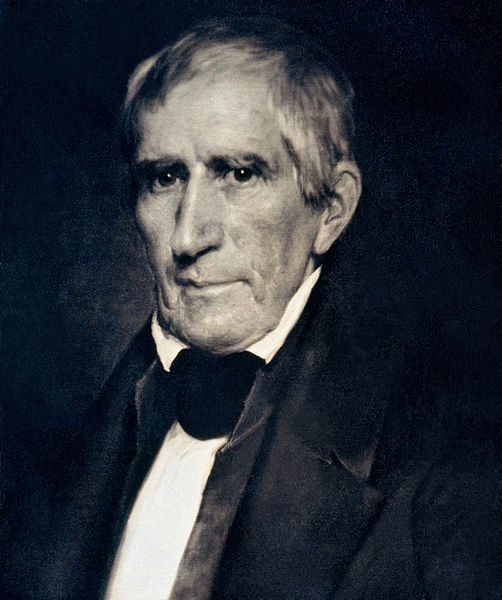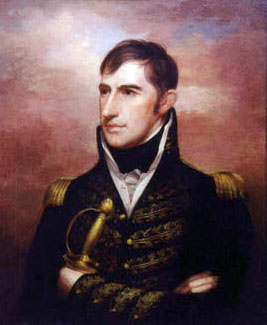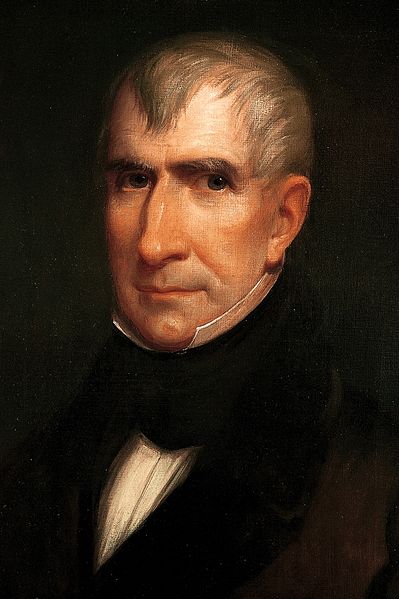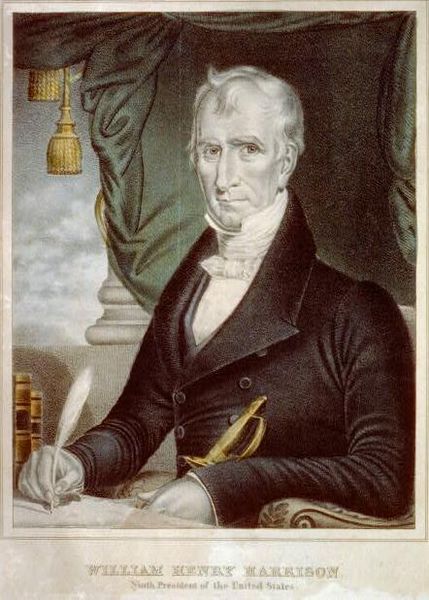| William Henry Harrison | |
|---|---|
 |
|
| 9th United States President « Previous Next » |
|
| In office | Mar. 4, 1841 – Apr. 4, 1841 |
| V. President | John Tyler |
| Political Party | Whig |
| Personal Info | |
| Born | Feb. 9, 1773 |
| Died | Apr. 4, 1841 (at age 68) |
| Religion | Episcopal |
| School | University of Pennsylvania |
| Hampden-Sydney College | |
| Profession | Military officer |
| Signature | |
| Wife | Anna Symmes |
| U.S. Presidents 1-15 | |
| 1. George Washington (1789–1797) | |
| 2. John Adams (1797-1801) | |
| 3. Thomas Jefferson (1801-1809) | |
| 4. James Madison (1809-1817) | |
| 5. James Monroe (1817-1825) | |
| 6. John Quincy Adams (1825-1829) | |
| 7. Andrew Jackson (1829-1837) | |
| 8. Martin Van Buren (1837-1841) | |
| 9. William Henry Harrison (1841-1841) | |
| 10. John Tyler (1841-1845) | |
| 11. James Knox Polk (1845-1849) | |
| 12. Zachary Taylor (1849-1850) | |
| 13. Millard Fillmore (1850-1853) | |
| 14. Franklin Pierce (1853-1857) | |
| 15. James Buchanan (1857-1861) | |
| List of All the Presidents |
William Henry Harrison’s term as the ninth President of the United States of America was the shortest. He immediately succumbed to pneumonia 30 days after his election as President. Although his presidency was short-lived, his political years were very colorful. William Henry Harrison left a memorable legacy not only to grandson, Benjamin Harrison who was later elected as the 23rd leader of USA, but to the entire American people as well.
Early Political Contributions
Born into one of the wealthiest families in the United States, William Henry Harrison started his political career as the Secretary of the Northwest Territory. The said territory included the States of Ohio, Indiana, Minnesota, Michigan, Wisconsin and Illinois. Harrison’s brilliance was put to the test during this time because the then Governor, Arthur St. Clair, was always absent and no one was left in-charge of the region’s affairs. Harrison became the acting governor during such absence.
As a member of the elite class during his time, William Henry Harrison had close ties with businessmen and other politicians. In fact, because of Harrison’s brilliance both in business and in politics, the elite eastern people looked up to the man as a frontier leader. The main problem during this period was the expensive prices of land in the northwestern territory. Harrison vigorously fought for lower land prices and continued to gain the admiration of so many people.
Harrison wanted to boost the image of the region to persuade people to migrate. Due to his advocacy, he was elected as the very first representative of the Northwestern Territory to the 6th US Congress. He was only 26 years old at that time. The said position was not a privileged one because Harrison was not allowed to take part in the approval of congressional bills. However, the committee allowed him to assist the working group, participate in various debates and to propose laws.
The greatest contribution of William Henry Harrison was the approval of the Harrison Land Act. The law made it possible for ordinary people with average income to purchase their own land in the Northwestern region. People who had acres of land were allowed to subdivide the same and sell the small tracts. Settlers began flocking to the region and rapid increase in the territory’s population ensued.
 During his congressional term, Harrison was one of those who recommended dividing the vast Northwestern Territory into two. The proposition was approved and the bill passed the readings in 1800 and this gave rise to the creation of the Territories of Ohio and Indiana. The popularity of Harrison became immensely great and the President at that time, John Adams, believed in his capabilities. Without even breaking the news to Harrison, President John Adams designated him as the new Governor of the newly created region.
During his congressional term, Harrison was one of those who recommended dividing the vast Northwestern Territory into two. The proposition was approved and the bill passed the readings in 1800 and this gave rise to the creation of the Territories of Ohio and Indiana. The popularity of Harrison became immensely great and the President at that time, John Adams, believed in his capabilities. Without even breaking the news to Harrison, President John Adams designated him as the new Governor of the newly created region.
President Adams knew of Harrison’s dedication to his work and his close relations to the territory. In addition to this, Harrison’s neutrality when it comes to politics is also a very important consideration. Because of his new appointment, Harrison had to resign from his congressional seat after a dialogue with the Jeffersonian group. Political upheavals were frequent during the 1800s but Harrison was assured that he will not be removed from office even assuming that the Jeffersonians gain the slot during the succeeding election.
Governor of the Indiana Territory
 The Indiana territory had its very first Governor in the person of young William Henry Harrison. This newly established region comprises of Indiana, eastern Minnesota, Michigan, Wisconsin and Illinois. Harrison took this position seriously and he had to move to the capital of the region which was Vincennes. There he constructed his Grouseland home, which has become a well-known tourist attraction today.
The Indiana territory had its very first Governor in the person of young William Henry Harrison. This newly established region comprises of Indiana, eastern Minnesota, Michigan, Wisconsin and Illinois. Harrison took this position seriously and he had to move to the capital of the region which was Vincennes. There he constructed his Grouseland home, which has become a well-known tourist attraction today.
William Henry Harrison was given an all-encompassing type of authority over the entire territory and began appointing his trusted officials who will in turn come up with an effective legislature for the region. Harrison’s primordial aim was to make Indiana a state and he was so focused in achieving this objective. Research says that this was because of Harrison’s own personal gain. His entire wealth and political ambitions at that time was connected to Indiana and if it became a state, he will definitely gain the benefit.
When President Thomas Jefferson was elected into office, he allowed Governor William Henry Harrison to negotiate several treaties with the Indians. A total of 13 treatises were signed through the efforts of Harrison and his staff. The agreement transferred more than 60 million acres of land from native Indian titles to the United States. A greater portion of southern Indiana, Sauk, Meskwaki and several parts of Missouri were literally surrendered to the leadership of the United States.
Role during the Battle of Tippecanoe
William Henry Harrison, Governor of Indiana led thousands of United States men against the Indian confederation under the leadership of Tecumseh and Tenskwatawa. Harrison’s troupe was caught by surprise in the early hours of the morning when a surprise attack was launched. However, because of good tactic and offensive strategy, Harrison was able to ward off the attack and destroyed Prophetstown and its people.
Harrison’s victory greatly incapacitated Tecumseh’s group and history shows that they never really recovered from such devastating blow. The result of the battle of Tippecanoe was advantageous for Harrison and he became even more popular. Native Indian tribal chiefs of Miami, Lenape and Pottawatomie agreed to sell more than 3 million acres of land to the United States because they trusted Governor Harrison’s leadership. Harrison’s dream of turning Indiana into a State came within grasp.
Established Political Career
 “Buckeye” Harrison, as he was endearingly called by his Westerner friends in Congress, finished the term of Ohio Representative John McLean. It was in 1819 when William Henry Harrison decided to shift to a higher post in government office and run for Senate. Because of Harrison’s good political record, he became the standard Whig candidate. Posters of Harrison’s accomplishments in war as well as his previous political career boosted his Presidential candidacy.
“Buckeye” Harrison, as he was endearingly called by his Westerner friends in Congress, finished the term of Ohio Representative John McLean. It was in 1819 when William Henry Harrison decided to shift to a higher post in government office and run for Senate. Because of Harrison’s good political record, he became the standard Whig candidate. Posters of Harrison’s accomplishments in war as well as his previous political career boosted his Presidential candidacy.
Good propaganda was developed for the Harrison Presidential campaign and completely erased his political stigma from that of a rich pro-slave elite leader to a humble and sincere frontiersman. His role during the war of Tippecanoe became his Presidential slogan and gained the trust and confidence of the electorate. Harrison had a formidable political campaign force and this enabled him to win the Presidential seat against his popular opponent, Van Buren.
President William Henry Harrison had many plans when he won the elections and mentioned all of these during his Presidential inaugural address. People had enormous hope for the Harrison administration because they regarded their leader as a formidable legislator. However, the hope began to fade because Harrison became very ill and his busy days in office did not help. President Harrison’s cold started after his inaugural speech.
Several doctors were called to treat the President’s pneumonia which later became worse when he had pleurisy but his condition did not improve. He had shivers and his health continued to deteriorate after nine days of being ill. President William Henry Harrison and his dreams for the United States ended on the 4th day of April, 1841.